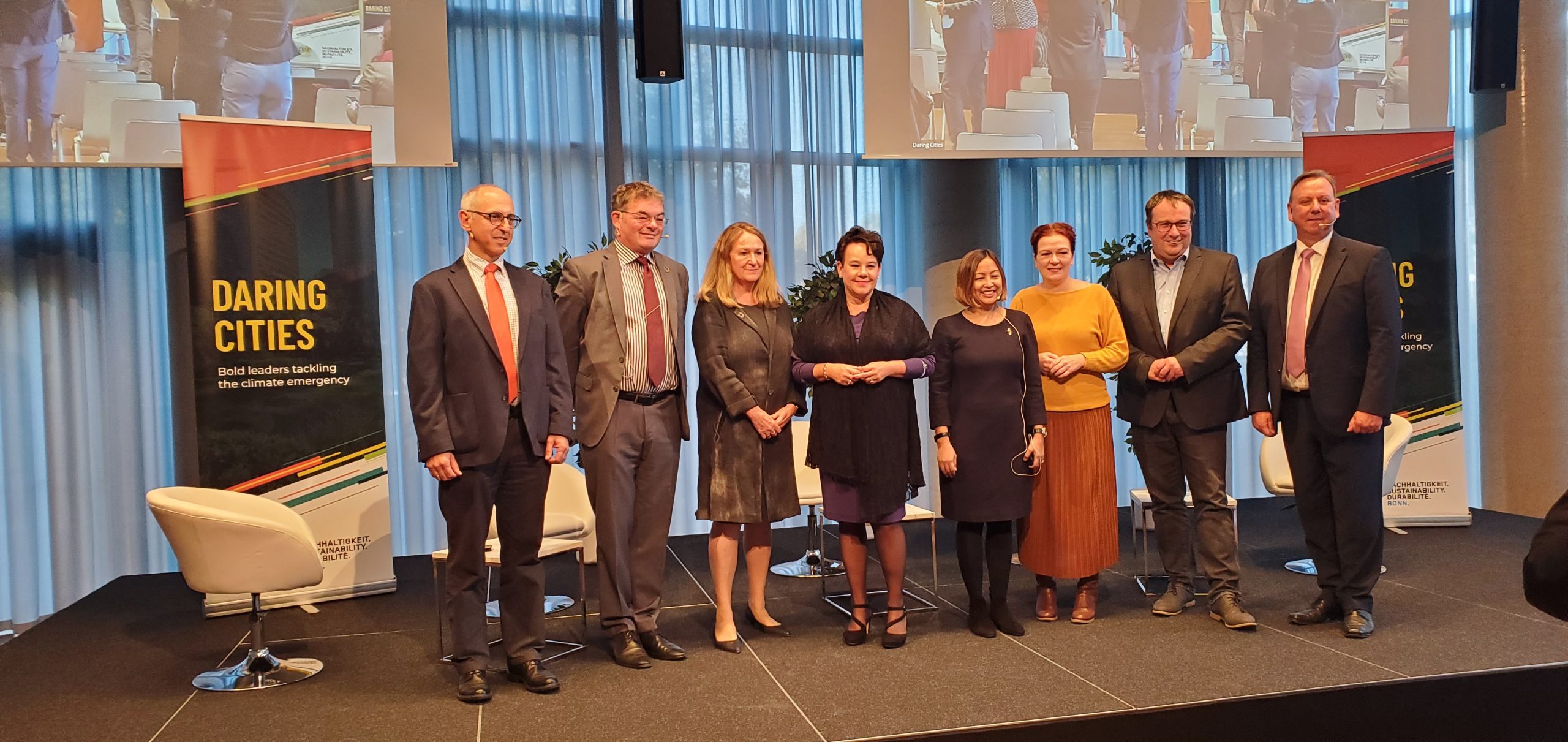Daring Cities 2022: Financing Climate Change Measures

Billboard
Skyscrapper
Halfpage
Daring Cities 2022 took place from 3 to 7 October. The virtual forum aims to empower municipal decision-makers, researchers, business leaders as well as civil society representatives to play a key role in climate change. Find out more about the five-day event here.
Daring Cities 2022
Daring Cities is a virtual, action-oriented forum created by ICLEI and the Federal City of Bonn aimed at urban leaders. The annual conference showcases exemplary local climate action to help other cities tackle the climate emergency. Global leaders around the world are struggling to address the climate crisis but daring actions such as the ones shown at Daring Cities 2022 are powerful.
Attendees at Daring Cities 2022, which lasted from October 3rd to October 7th, included mayors, decision-makers, technical staff, researchers, private sector representatives, as well as community organisers. Inspired by the example of the city of Bonn, participants discussed how to disrupt business-as-usual and shift instead towards “business-as-possible”.
The programme consisted of high-level dialogues, side events, workshops, and other sessions. Almost every session was accessible online to anyone who registered to Daring Cities 2022. Examples for resilience-building and climate mitigation took centre stage, as did the topic of funding climate change. The triple “C” crisis of COVID-19, climate, and conflict was also key to many of the discussions.
As part of Urban October and inspired by the United Nations’ World Habitat Day, which coincided with the first day of Daring Cities, the event brought attention to the role of cities and local governments in responding to crises and emergencies. They key question was how to plan for an inclusive, resilient, and green future.
Read more about the IPCC Climate Report 2022 and the urgency of the climate crisis here.

Spotlight on financing climate action
Over 2,000 jurisdictions from all over the world have formally declared a climate emergency. There is no shortage of projects that cities want to launch to reach their ambitious goals. However, they often struggle with funding. According to Eszter Mogyorósy, ICLEI’ Head of Innovative Finance at the ICLEI World Secretariat, the projects aren’t being held up “because the funds aren’t available but because the funds are not accessible… particularly for the Global South.”
This inaccessibility is due to a combination of lack of local technical expertise and the current system of climate finance, which is not in emergency mode. Therefore, it can take 12 to 18 months to access the expertise needed just to conduct a technical study or prepare a business model.
Daring Cities 2022 aimed at accelerating the climate emergency response. Accordingly, the conference focused on finance and the kind of systematic change that is necessary to speed up the process. The organisers wanted to kickstart discussions on what it means to finance the climate emergency and how it differs from a regular finance business model.
Global Leaders roundtable – Innovative climate finance for multilevel action towards COP27
At this Daring Cities 2022 event, Bonn’s mayor Katja Dörner gave a keynote speech to showcase the conference’s focus on climate focus. She expressed the importance of any climate programme fitting local needs. In the case of Germany, climate measures on the local level are still voluntary, not mandatory. According to mayor Dörner, this must change. Currently, investments in climate measures have to compete with other investments. This means that poorer cities are not free to decide their own budget and have to focus on their mandatory tasks and duties.
Panellists agreed that citizens and decision makers must be aware of the importance of climate adaptation funding. The 2021 floods in Germany’s North Rhine-Westphalia region showed that investments in resilience and disaster preparedness have room for improvement. Due to old-fashioned plans and outdated budget requirements, it is difficult for local governments to find funding.
Accelerating local climate action
Cities that are already successful in closing the financing gap are Makati in the Philippines and Monterrey in Mexico. Both are examples of “pioneering local governments”, according to Daring Cities 2022. They are already driving the fight against climate change at the local level. Here, the fact that they are financial hubs in their respective countries is helpful.
At Daring Cities 2021, there was a focus on African cities. In 2022, much of the attention centred on challenges and opportunities in Central and South America. Colombia’s strategy for protecting the Amazon rainforest through nature swaps, as pioneered by the country’s new president, Gustavo Petro, is one example for a solution from the continent.
Another example is the city of Bonn itself. Interestingly, he host city to Daring Cities has a leadership role in reducing the pace of global warming. As the seat of the United Nations Framework Convention on climate change (UNFCCC), the city hosts many high-profile climate conferences. But it does not only serve as a discussion hub. Rather, Bonn shows how to put words into action with a climate goal of becoming climate neutral by 2035. The city has also implemented a formal reporting system on its progress towards the Sustainable Development Goals.
Continue reading: In July 2022, Bonn published its second Voluntary Local Review of the SDGs.












